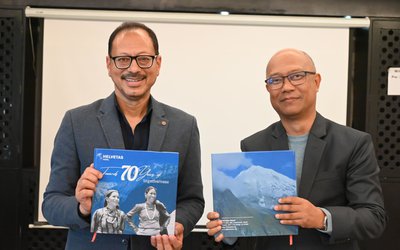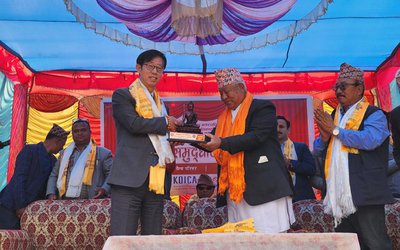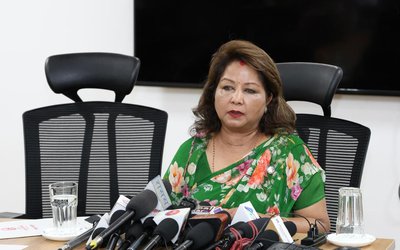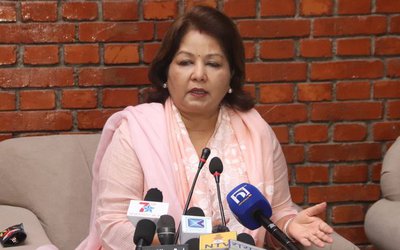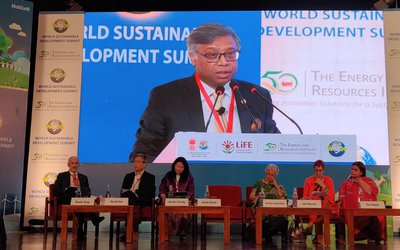
Nepal's agriculture sector is facing new challenges due to declining cultivated land and increasing imports of agricultural products. Despite being a net exporter of agriculture two decades ago, Nepal is now a net importer of agricultural products.

Karnali, Sudur Paschim, and Lumbini provinces are also experiencing deficits in agricultural production.
In the first four months of the current fiscal year 2023/24, Nepal imported agricultural products worth Rs. 85 billion. According to the Department of Customs, the amount exceeds the total export by almost Rs. 35 billion.
In response to this alarming scenario, Helvetas Nepal's InElam Project and the Ministry of Land Management, Agriculture, and Cooperatives of Sudur Paschim Province jointly organized an inter-provincial coordination and sharing workshop.
During the day-long program, three provincial government leaders presented their annual policies, programs, plans, and strategies. They also discussed federal, provincial, and local policies, rules, and regulations.
At a time when all provinces are facing similar problems, including managing the agriculture extension network, crop management, fertilizer supply, and irrigation, an Inter-Province Coordination and Learning Exchange Workshop is highly significant to share the challenges and opportunities faced by each province.
The first inter-provincial coordination workshop brought together agriculture secretaries, senior officials, experts, farmers, civil society members, and entrepreneurs from Sudur Paschim, Karnali, and Lumbini Provinces. Its purpose was to facilitate dialogue, coordination, and knowledge sharing among stakeholders involved in the agriculture sector.
Although Nepal's agriculture sector has performed poorly in all provinces over the last decade, no concrete steps have been taken to address the common challenges.
Tika Ram Thapa, joint secretary of the Land Management, Agriculture, and Cooperative Ministry in Sudur Paschim Province, expressed gratitude to the In-Ilam Project of Helvetas Nepal for their support in organizing this workshop. The workshop has provided an opportunity to share experiences and shortcomings. A meeting was held among all seven provinces to discuss politics, programs, and share learning. The Ministry would like to express gratitude towards Helvetas Nepal, despite the fact that the organization has already completed its project in our province.
The Sudur Paschim Province Agriculture Ministry and Helvetas Nepal's Elam project have been working closely together for the past seven years. This is another successful collaboration to create an open platform for sharing experiences of public light among the secretaries and directors of all three provinces," said Thapa.
Others agree. "The communication network between agricultural experts and officials has completely broken down in the last eight years." Dr. Narahari Prasad Ghimire, secretary of Agriculture, Lana Management and Cooperative Ministry of Karnali Province, stated that the program was renewed after participating in the Inter-Province Coordination and Learning workshop. Dr. Narahari Prasad Ghimire, secretary of Agriculture, Lana Management and Cooperative Ministry of Karnali Province, stated that the program was renewed after participating in the Inter-Province Coordination and Learning workshop. Dr. Narahari Prasad Ghimire, secretary of Agriculture, Lana Management and Cooperative Ministry of Karnali Province, stated that the program was renewed after participating in the Inter-Province Coordination and Learning workshop. He also expressed the need for more programs like this in the future.

Narayan Prasad Sigdyal, the Head Master of Jana Jyoti Secondary School in Surkhet, shared his concept of a 'learn and earn' program currently implemented in his school. He discussed the endorsement of the program by the federal government to boost the agriculture sector.
Sigdyal emphasized the importance of providing vocational education focused on agriculture and teaching students the value of 'learn and earn.'
Sigdyal requested that local, provincial, and federal governments focus their attention and resources on utilizing CTV products in agricultural production across the country. He believes that agriculture should be taught to students from an early stage.
Top Lal BK, a prominent banana farmer and entrepreneur from Bardia of Lumbini Province, presented the current state of banana farming and the challenges faced by farmers.
BK, who started banana farming on a small plot of land and now grows bananas on over 20 bigha (five acres), believes that Nepal has the potential to be self-reliant in banana production and even become an exporter with proper government support. Currently, Nepal is importing bananas, but with a review of import policies and incentives for land leasing and irrigation, Nepal could start exporting bananas to China within a few years.

Prabin Paudel from Helvetas Nepal's Mitho project presented a paper on the opportunities for cash crop production in Nepal, specifically highlighting the potential for high-quality walnut production in the country's high hills.
Despite the lack of policy-level support, Nepalese farmers can benefit from exporting walnuts to third countries. However, farmers have yet to plant walnuts on a mass scale. Paudel stated that the project aims to increase the number of walnut trees in Jumla and surrounding areas. This increase in production can significantly reduce poverty in the Karnali province. Close coordination and cooperation between local, provincial, and federal governments is necessary for this to happen.
Dutta Ram Avasthi, a senior official from Sudur Paschim Province, supported Paudel's presentation, stating that the barren hills of Sudur Paschim are suitable for growing walnuts.
The seminar brought together agriculture experts, policymakers, higher government officials, and farmers, including secretaries from three provincial governments, to share their experiences and knowledge. One positive outcome is that everyone agreed to continue this process in the future at various levels.
"A key component of Helvetas Nepal is supporting the capacity building of all three branches of government." We have been offering technical and administrative assistance to the federal, provincial, and local governments. Inter-provincial coordination is critical to the successful implementation of a federal system in Nepal. "The InElam Project effort will most likely support regular inter-provincial dialogue," stated Dr. Prabin Manandhar, country director of Helvetas Nepal.

The workshop raised the price chain facility of various agricultural items, such as fruits, vegetables, bananas, walnuts, seeds, and fish. It also included reading and earning programs. It is important to ensure self-sufficiency in agricultural items.
Dr. Madan Singh Dhami, Secretary of Land Management, Agriculture, and Cooperative of Sudur Paschim Province, suggested conducting this kind of inter-provincial learning and sharing exchange workshop at least twice a year, even on Zoom. We must thank Helvetas for this initiative and seek another one to hold a similar workshop in all seven provinces. Our province is ready to collaborate with Helvetas Nepal for this.
The workshop emphasizes the marketing aspect and urges officials to encourage domestic products while discouraging imports. To achieve this, they suggest avoiding an increase in the use of technology, facilitating objective pricing, and following good practices.
Yam Narayan Devekota, the Secretary of Agriculture and Land Management of Lumbini Province, thanked Helvetas Nepal for supporting the workshop that helped to restore the link among the three ministries.
Devekota expressed his satisfaction with the new effort and emphasized the importance of these workshops in restoring communication among the agriculture-related ministries. Devekota expressed his satisfaction with the new effort and emphasized the importance of these workshops in restoring communication among the agriculture-related ministries. The workshops help to improve understanding and learning of good practices and failures.
Communication gaps among provinces can lead to a decline in agricultural production, possible food insecurity, and can even push struggling farmers into poverty. This is especially concerning for a country that relies on agriculture for more than a quarter of its GDP.

Farmers in Nepal are facing setbacks in agricultural production due to climate change, soil degradation, and cheaper imports from neighboring countries. Addressing these challenges is crucial.
In 2022, the agriculture sector contributed 23.95% to GDP, while the manufacturing sector contributed 14.3%. In 2000, 75% of Nepal's population relied on agriculture for their livelihood. By 2022, this had decreased to 66%.
Our project includes advocacy as one of its components. Hari Gurung, the InElam Project Manager, stated that the organization advocates for policy change and the creation of a conducive environment for resource-based enterprises. The focus is on employment generation by promoting local resources and creating value chains through a market system development approach.
The aim is to benefit disadvantaged women and men in Nepal by providing employment opportunities through the productive use of local resources. The workshop's issues are relevant in the present context.

Akriti Rana from Helvetas Nepal stated, "Our primary stakeholders are unemployed and underemployed men and women from disadvantaged groups. The project advocates for policies and programs that require intensive meetings between government officials, private sectors, and farmers to be favorable."
The agricultural sector's contribution to the GDP has steadily declined over the years. In the fiscal year 2013/14, the sector accounted for 30.3% of the GDP, while in the last fiscal year, it accounted for 24.7%. This decline is due to the increasing use of technology and professionalism in agriculture, as well as the expansion of the service sector, which has led to a gradual decrease in the population's involvement in agriculture.
The growth of agricultural production has been affected by several factors, including the increase in barren land in hilly areas, more young people going abroad, and people being attracted to other areas instead of agriculture. As a result, the contribution of agriculture to the total domestic product has decreased.
In the last fiscal year 2022/23, agricultural goods worth Rs. 296.30 billion were imported. To increase agricultural production, it is necessary to create plans and policies that are favorable. Dr. Ghimire, the agriculture secretary of Karnali province, stated that the province is working towards producing organic agriculture products for export.
The country has imported vegetables and lentils worth over Rs. 11.8. All provinces need to focus on replacing these imports. Our twenty-year agriculture strategy is directed towards this goal,” said Dr. Ghimire.
Officials from Sudur Paschim and Lumbini Provinces shared their annual and long-term agriculture programs, expressing their belief in the possibility of reducing imports and promoting exports.

Sudur Paschim Province is focusing on cash crops supported by cereal. Dr. Madan Singh Dhami, secretary of Land Management, Agriculture and Cooperative, Sudur Paschim Province, stated that evaluating the current trends in demand and supply is crucial. Our long-term agriculture plan prioritizes this.
Despite Nepal's own production, 33,340,140 kg of apples worth Rs. 3.26 billion were imported last month. Secretary Dr. Ghimire stated that apple plantations are being expanded in Dolpa, Jumla, Mugu, and Humla. Results are expected within a few years.
InElam project has supported multiple advocacy programs to bring changes to policies, regulations, agriculture, livelihood, and employment generation sectors.
Last month, we led a delegation of farmers to visit the agriculture committee of the federal parliament and federal ministries related to agriculture. We advocated for solutions to the problems and policies that obstruct agriculture development. We called on the Minister of Finance, Agriculture, and the Managing Director of Nepal Electricity Authority. The concerned authorities responded positively to our demands. I believe that these activities will help Nepal become an agricultural country. In the past, the government has responded positively to issues raised by farmers' delegations. Tek Bahadur Singh from Helvetas Nepal Karnali Provincial Office said, 'They will take drastic steps this time as well.'
Our project aims to support and promote resource-based enterprises at the policy level through advocacy. We do this by strengthening the capacity of farmer-related associations at the district level, such as the Banana Association, Dragon Association, and Floriculture Association. We provide all necessary training to strengthen the capacity of the farmers and support their participation in workshops.
InElam's Learning: Experience Sharing in Madhesh
Nepal is in the initial stages of state reform, with three tiers of government operating at three levels. Lack of coordination and cooperation is a significant impediment to the implementation of development projects and programs.
On December 30th, Helvetas Nepal's InElam Project and Madhesh Province's Ministry of Industry, Commerce, and Tourism co-hosted an interaction program in Bardibas, Mahottari district. The initiative sought to overcome the lack of coordination between Madhesh province and local governments, which had produced issues during project implementation.

The gathering was attended by province and municipal government officials, members of the private sector, political parties, and media personnel.
They discussed their experiences and learnings from Helvetas Nepal's InElam initiative. The initiative was started by Rahbar Ansari, State Minister of Madhesh Province's Ministry of Industry, Tourism, Forestry, and Environment.
Representatives from the Ministry of Land Management, Agriculture, and Cooperatives, as well as the head of the Food Technology and Quality Control Department, attended the ceremony on behalf of the Madhesh government.
Mayors, deputy mayors, executive officers, the Birganj Industry and Commerce Association, and various business associations from the Madhesh province, such as fish, honey, banana, and herb producers, service providers, and farmers, all took part in the program. This was the first of its sort, and the goal was to share what they had learned.
Hari Gurung, the InElam Project's program manager, discussed his experiences with the Bagar project, enterprise development, and other initiatives. He spoke about how these programs have affected the livelihoods of disadvantaged and marginalized groups.
Sushil Sah, Secretary of the Ministry of Education and Culture, spoke on behalf of Madhesh Pradesh. Entrepreneurs, farmers, local government officials, and political leaders all gave their thoughts. During the discussion, farmers and business owners shared their experiences and proposed potential solutions to the government.
They voiced worry that small fish farmers being paying the same electricity rates as larger companies. Madhesh province is well-known for its fish production, however there is insufficient technical manpower to support the business.
The farmers urged that the province administration and Helvetas Nepal help build a cold storage facility and processing technologies for fish storage.
They also proposed revising the current agriculture loan program to make it more accessible to poor and marginalized farmers. They also wanted a land-use policy to address the issue of land for cash crops.
The farmers also advocated for separate horticultural and fishing rules to help small businesses. They also advocated for a simpler approach for obtaining a quality certificate for products like honey. The milk producers sought that the government's milk subsidies be credited directly to their accounts.
Ansari, the State Minister of Industry, Tourism, Forestry, and Environment, recognized Helvetas Nepal's excellent role in growing firms in both the agricultural and non-agricultural sectors. He claimed that Helvetas gives regular support in contrast to other organizations, and the Madhesh government is closely with them.
Ansari, the state minister, assured participants that the provincial government is taking the necessary steps to address issues such as registration, cold storage construction, and agricultural electricity tariff reductions for a variety of industries, including bananas, fish, bees, vegetables, forest herbs, and non-agricultural sectors.
Furthermore, he indicated that the Madhesh administration is willing to provide financial, technical, and marketing assistance to entrepreneurs starting businesses in both agricultural and non-agricultural areas.
Hariwan Municipality Mayor Kamal Budathoki said that Helvetas Nepal's In-Ilam, Swablamban Market Management, and Employment Creation Center Hariwan Pvt. Sarlahi had inked a tripartite agreement to develop a model municipality.

He stated that the partnership intends to encourage dairy and vegetable production, support young agricultural entrepreneurs, and produce revenue through waste management in the city.
Ram Prasad Chaudhary, Mayor of Kolbi Municipality in Bara district, declared that Kolbi is a model region in Nepal for fish farming. Helvetas Nepal's InElam worked with the municipality to construct a fish processing facility.
Municipal officials met with the federal government to discuss the problem of agricultural electricity tariffs.
The mayor of Durgabhagavati Municipality in Rautahat, Shambhu Kumar Singh, announced that the municipality has incorporated Helvetas Nepal in the initiative to maintain paddy field agriculture.
All of the participants in the interaction program asked Helvetas Nepal to keep funding economic and social development since it has been helping the underprivileged and disenfranchised.

Keshab Poudel
Poudel is the editor of New Spotlight Magazine.
- US SUSPESION OF GRANT: Impact On Nepal
- Mar 10, 2025
- Helvetas Nepal has been instrumental in Nepal's development.: Dr. David Seddon
- Mar 08, 2025
- PM OLI’S MOVE TO REMOVE MD GHISING: Sparking Political Clash
- Mar 07, 2025
- Nepal and India: More Cross Border Transmission line
- Feb 12, 2025
- MAHAKUMBH 2025 Festival Of The Century
- Feb 10, 2025
